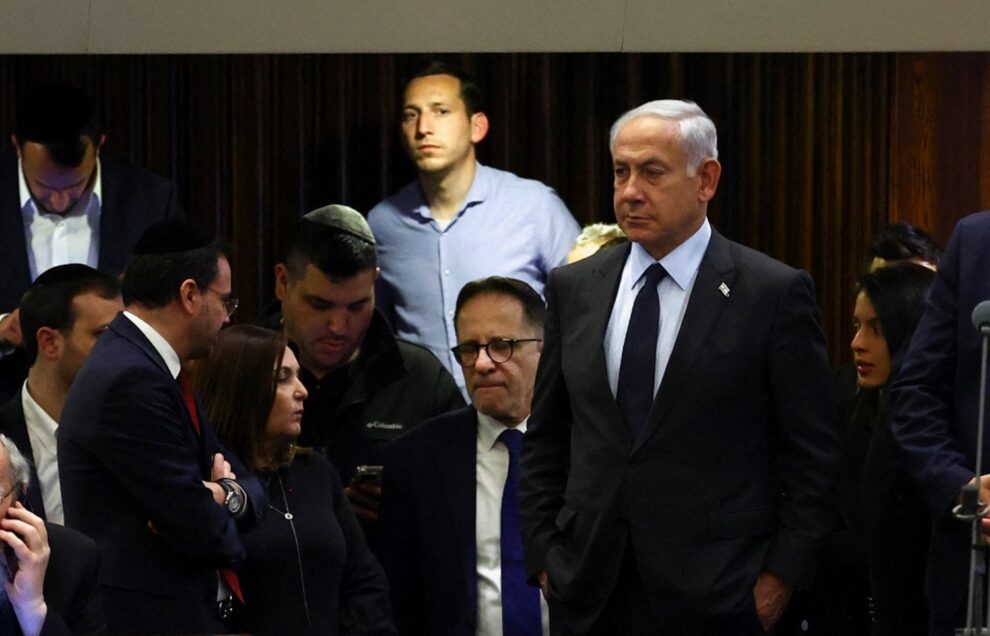Former military intel chief says senior White House official he spoke with shrugged off trip, calls move ‘a bluff’ and says PM ‘has much stronger cards’ to improve ties with US
Prime Minister Benjamin Netanyahu’s plans for an upcoming trip to China were panned Tuesday by a former top general and several lawmakers, who warned such a visit could greatly undermine Israel’s strategic interests by harming ties with the United States.
Zman Yisrael, The Times of Israel’s sister site, reported Monday on the advanced contacts between Jerusalem and Beijing on a potential meeting between Netanyahu and Chinese President Xi Jinping and other senior officials. Israeli diplomatic sources said the visit, a date for which was yet to be set, was aimed at showing Washington that Netanyahu has other diplomatic options.
Netanyahu’s office confirmed the report on Tuesday, saying Washington had been notified about the planned visit a month ago and insisting that ties with the US were at an “all-time high.”
Netanyahu has been seeking an invite to the White House but has been kept at arm’s length by US President Joe Biden, amid disagreements between Washington and Jerusalem over the Israeli government’s judicial overhaul push, policies in the West Bank and a potential interim nuclear deal between Iran and the US.
Former IDF military intelligence chief Amos Yadlin, who is believed to be close with parts of the American defense establishment, said the move appeared to be aimed at imitating Saudi Arabia, after China brokered a rapprochement between the kingdom and Iran — an agreement seen as a signal by Riyadh that it has other diplomatic options as the US pivots away from the Middle East.
“This is a step that will harm Israeli interests and not advance them,” Yadlin wrote in a series of tweets. “If someone in the prime minister’s circle thinks it’s smart to act like [Saudi Crown Prince Mohammed] bin Salman and travel to China to annoy Biden and show him that Israel has another strategic option, he’s making a serious mistake and doesn’t understand the importance of the competition between the geopolitical superpowers of the 21st century.״
Yadlin noted that unlike Israel, Saudi Arabia doesn’t receive billions annually in US military assistance; doesn’t depend on an American veto at the UN Security Council; is not reliant on US financial guarantees; and does not have the most advanced American weapons systems.
“Israel needs the Biden administration to advance its strategic goals: preventing Iran from [obtaining] nuclear weapons and adding Saudi Arabia to the circle of normalization,” he said, referring to a potential peace deal between Jerusalem and Riyadh.
The retired general stressed that China regularly votes against Israel at the UN, is a longtime supporter of the Palestinians and has a “strategic alliance” with Iran. He also said China cannot match the US in terms of “security, strategic and operational cooperation,” while highlighting previous Israeli commitments not to sell advanced weaponry to China over concerns it could contain American technology.
“The Israeli signal is a bluff that isn’t expected to improve Israel’s position vis-à-vis Washington,” added Yadlin, who is also a former head of the Institute for National Security Studies at Tel Aviv University. “The prime minister has much stronger cards [to play] in order to put ties with the US back on track.”
Yadlin also said during an interview with Army Radio Tuesday that he had spoken with “a very senior” Biden administration official who shrugged off Netanyahu’s planned trip.
“If the prime minister wants a serious diplomatic process with Chinese mediation, we’re in favor,” he quoted the official as saying, referring to Beijing’s offers to broker Israeli-Palestinian peace talks.
Tamir Hayman, the director of the Institute for National Security Studies, said Tuesday that such a visit would be a “serious mistake.” Hayman, a former IDF intelligence chief, wrote on Twitter that such a trip by Netanyahu is “terrible timing both tactically and strategically,” adding that: “The special relationship with the US is in danger. This act could definitely cause damage.”
Opposition MK Ram Ben Barak of the Yesh Atid party said the trip would be a “strategic mistake of the first order.”
“We don’t have the privilege of doing this, definitely not these days. The US is an ally with whom we share not only interests but also values,” Ben Barak, a former No. 2 in the Mossad intelligence agency, wrote on Twitter.
MK Danny Danon, one of Netanyahu’s most vocal critics in his ruling Likud party and a former ambassador to the United Nations, told Kol Barama radio that he would advise the premier to hold off on meeting Xi.
Additionally, unnamed Israeli officials ripped Netanyahu’s proposed visit in remarks to Army Radio, calling it a “dangerous risk” and slamming the premier’s conduct as “crazy.”
“Israel is liable to become a pawn in the cold war between China and the US,” one of them said.
US President Joe Biden meets then-opposition leader Benjamin Netanyahu (right) at the President’s Residence in Jerusalem, July 14, 2022. At left is Secretary of State Antony Blinken; 2nd-left is US Ambassador to Israel Tom Nides. (GPO)
Planning for the trip came as ties between Jerusalem and Washington have suffered under the current government, with the Biden administration increasingly outspoken in its criticism of Israeli policies. Despite the displeasure, the US has taken little action against Israel besides the lack of an invite for Netanyahu.
While aimed at getting Biden’s attention, the visit could also potentially put Netanyahu at odds with Republicans who have taken a more hawkish stance toward China. While addressing the Knesset last month, US House Speaker Kevin McCarthy slammed China over its trade practices and human rights record, leading the Chinese embassy to accuse him of seeking “to sow discord” in Beijing’s relations with Jerusalem.
Under successive administrations, Washington has expressed concern regarding Israel’s warming economic ties with China, with a US government official calling in December for Jerusalem to take greater action to defend the local tech industry from Chinese influence.
But despite a US-China trade war that has ebbed and flowed in recent years under both the Trump and Biden administrations, Israel and China have seen warming relations and more interest in Israeli innovations, especially in medical tech, robotics, food tech and artificial intelligence.
Washington’s main concerns lie in potential dual-usage technologies, where various technologies would have both civilian and military applications. At the same time, Israel has regulations in place to prevent the sale of sensitive military-related technology to China (and other countries), following a 1990s deal in which Israel had to scrap the sale of advanced airborne radar systems to China amid fierce US opposition.
Source: Times of Israel
















